
(Left to right) French President Francois Hollande, U.S. President Barack Obama and German Chancellor Angela Merkel prior to their "family photo" at the G8 summit on 19 May 2012.
2012 has been the year of elections and ideological divisions. France is no exception to the rule. On May 15th, 2012, François Hollande officially became the President of France. His first action was to fly to Berlin, despite the weather, in order to meet with German Chancellor Angela Merkel. This strategic move is important for two reasons: first, President Hollande established himself in the rupture with his predecessor, who visited London before Berlin; second, the Franco-German machine is rightfully perceived as the cornerstone of Hollande’s European policy.
However, what is quite interesting is the wide gap between the themes of the debate between French candidates for the presidency and the reality of the function. Most of the debates and programs–either in France or in the US, or even in any countries with an active foreign policy–dealt with domestic and socio-economic policies, but not foreign policy. As a foreign policy expert, it is quite disappointing to see a lack of interest in such a vital part of the job for the candidates for the highest office. In a world becoming more and more globalized, why does foreign policy barely matter on the agora? Do voters not understand that policies implemented in another region of the world will ultimately affect their lives in one way or another? A large segment of the foreign policy literature emphasizes on the fact that all politics have increasingly become “glocal.” It is true that foreign policy is fashioned by local events and citizens, but it is also undeniably shaped by the international system and shifting balances of power.
In the case of the French presidential elections, Messrs. Hollande and Sarkozy spent very little time on foreign policy. Mr. Sarkozy could not advertise on his pseudo successes considering their unforeseen consequences. For example, his Libyan campaign has cost the international community the ability to launch future military and/or civilian missions through the UN. Russia and China, rightfully, felt manipulated by the way the French led coalition used the UNSC Resolution 1973 in order to oust Colonel Qaddafi. Even though, Mr. Hollande had the edge over his predecessor throughout the last part of the race, it is quite striking that no one, outside of his close advisors, had a grasp of his visions in foreign and defense policies. So far he has appeared to be aligned with the Gaullist tradition, which has been confirmed by the recent appointment of long time socialist politician Laurent Fabius at the head of the French diplomacy.
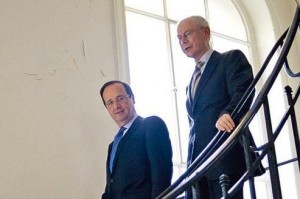 On May 9th, Europe’s day, and three days after his election, newly elected French President, Mr. Hollande, spent the day on the phone with world leaders and hosting high level EU officials, among them President Van Rompuy. The reality is quite different than the expectations. French citizens elected the candidate that represents their best interests for their own standard of living and to solve the domestic economic turmoils. His social and economic policies are one thing, but his defense and foreign policies are very little known. Mr. Hollande has not discussed so far how he plans to cooperate with Ms. Ashton, how he sees the EEAS, and what is the future of CSDP missions, and where does France stand with and within NATO. He has tried to clarify his position during the meetings in Washington and Chicago earlier on in May.
On May 9th, Europe’s day, and three days after his election, newly elected French President, Mr. Hollande, spent the day on the phone with world leaders and hosting high level EU officials, among them President Van Rompuy. The reality is quite different than the expectations. French citizens elected the candidate that represents their best interests for their own standard of living and to solve the domestic economic turmoils. His social and economic policies are one thing, but his defense and foreign policies are very little known. Mr. Hollande has not discussed so far how he plans to cooperate with Ms. Ashton, how he sees the EEAS, and what is the future of CSDP missions, and where does France stand with and within NATO. He has tried to clarify his position during the meetings in Washington and Chicago earlier on in May.
Since his election, President Hollande has been principally focusing on international questions. In less than a month, he 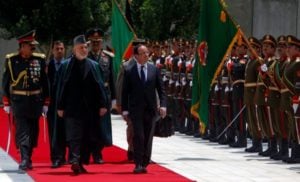 met with world leaders in Washington D.C. and Chicago as well as G-8 leaders in Camp David. Following his North-American tour, he rightfully flew to Afghanistan where he met with President Karzai and French troops on the ground. This over-activity on international affairs has several rationales: first, Mr. Hollande is in his honeymoon period, which should last until the end of the summer, allowing him to focus on pressing issues; second, Mr. Hollande needs to create his network. He does not have any international experience, and he is very little known outside of France. He ultimately needs to catch up; third, Mr. Hollande wants to send a strong message on the international stage, France is still present, active and powerful, despite the transition of power and style. Any major international decisions will have to go through France.
met with world leaders in Washington D.C. and Chicago as well as G-8 leaders in Camp David. Following his North-American tour, he rightfully flew to Afghanistan where he met with President Karzai and French troops on the ground. This over-activity on international affairs has several rationales: first, Mr. Hollande is in his honeymoon period, which should last until the end of the summer, allowing him to focus on pressing issues; second, Mr. Hollande needs to create his network. He does not have any international experience, and he is very little known outside of France. He ultimately needs to catch up; third, Mr. Hollande wants to send a strong message on the international stage, France is still present, active and powerful, despite the transition of power and style. Any major international decisions will have to go through France.
Foreign policy has been the missing element throughout the election campaign across the world. The US is in the same dynamic. The emphasis in the US has been on the debt crisis, health care, youth unemployment, housing crisis, and gay 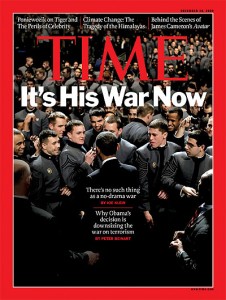 rights. What about military and foreign policy? What about the legality of targeted killings through drones in Pakistan and Yemen? How can the US consider itself a hegemon when foreign policy is one of the lowest issues on the agenda? President Obama has been quite active on the international stage with very little resonance domestically. Ironically, many see him and describe him as weakening US power and as a weak leader for the reason that he has not been scared to use multilateralism and diplomacy first. From a European point of view, Mr. Obama has been in the continuity of his predecessor, George W. Bush, minus the arrogance. Despite his pledge to strengthen and defend human rights and international law, US foreign policy during the first Obama administration has been in the continuity of George W. Bush. Guantanamo Bay remains open; the night raids of drones are extremely active in Afghanistan, Pakistan, Somalia and Yemen; the US has been extremely active in the Pacific region strengthening alliances with strategic actors; and multilateralism has been more à la carte than au menu. None of these questions have been raised and discussed thoughtfully in public. The only foreign policy argument/disagreement is an ideological one: is the US an exceptional actor? And has President Obama damaged or not American exceptionalism? From a practical and strategic point of view, this is an absolutely irrelevant discussion.
rights. What about military and foreign policy? What about the legality of targeted killings through drones in Pakistan and Yemen? How can the US consider itself a hegemon when foreign policy is one of the lowest issues on the agenda? President Obama has been quite active on the international stage with very little resonance domestically. Ironically, many see him and describe him as weakening US power and as a weak leader for the reason that he has not been scared to use multilateralism and diplomacy first. From a European point of view, Mr. Obama has been in the continuity of his predecessor, George W. Bush, minus the arrogance. Despite his pledge to strengthen and defend human rights and international law, US foreign policy during the first Obama administration has been in the continuity of George W. Bush. Guantanamo Bay remains open; the night raids of drones are extremely active in Afghanistan, Pakistan, Somalia and Yemen; the US has been extremely active in the Pacific region strengthening alliances with strategic actors; and multilateralism has been more à la carte than au menu. None of these questions have been raised and discussed thoughtfully in public. The only foreign policy argument/disagreement is an ideological one: is the US an exceptional actor? And has President Obama damaged or not American exceptionalism? From a practical and strategic point of view, this is an absolutely irrelevant discussion.
American citizens have not been very concerned with overall foreign policy issues at the exceptions of several very specific questions, terrorism and military spending, as proven by a recent poll by Pew Research Center (below). These priorities are too broad and do not reflect the changing international pressures such as the rise of the BRICS, the future of NATO, multilateralism vs unilateralism, the development and aid policies of the US, and the protection/enforcement of human rights.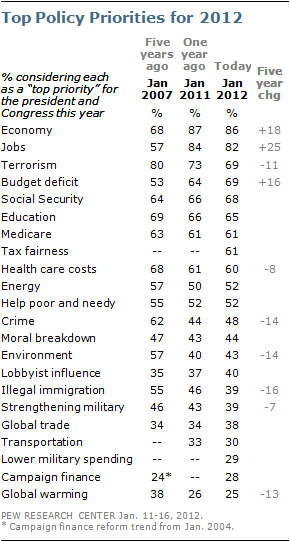
The lack of interest on the outside world in developed countries is striking. The international system and the ou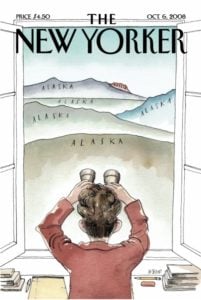 tside forces have much more power and influence than believed. One answer to this lack of interests in the making of foreign policy starts directly from the top, policy makers. In France, Mr. Hollande has made a core pledge to strengthen education. In the US, Mr. Obama has done the same. However, the pledge often emphasizes hard sciences over social sciences. The most obvious proof of this statement is the recent amendment passed by the US House of Representatives, under Republican control, to prohibit National Science Foundation (NSF) funding to political science projects. Politicians, especially in the US, have increasingly tried to limit research and debates on and in politics. No surprise political debates are only superficial. The lack of debate in foreign policy is not only an illustration of the navel-gazing behaviors of the societies of the Euro-Atlantic community, but also a political move by political elites. The cost of ignoring foreign policy could be greater than expected. By ignoring important international questions, leaders of the Euro-Atlantic community are establishing precedents without measuring their future impacts on the security and power of the members of the Euro-Atlantic community.
tside forces have much more power and influence than believed. One answer to this lack of interests in the making of foreign policy starts directly from the top, policy makers. In France, Mr. Hollande has made a core pledge to strengthen education. In the US, Mr. Obama has done the same. However, the pledge often emphasizes hard sciences over social sciences. The most obvious proof of this statement is the recent amendment passed by the US House of Representatives, under Republican control, to prohibit National Science Foundation (NSF) funding to political science projects. Politicians, especially in the US, have increasingly tried to limit research and debates on and in politics. No surprise political debates are only superficial. The lack of debate in foreign policy is not only an illustration of the navel-gazing behaviors of the societies of the Euro-Atlantic community, but also a political move by political elites. The cost of ignoring foreign policy could be greater than expected. By ignoring important international questions, leaders of the Euro-Atlantic community are establishing precedents without measuring their future impacts on the security and power of the members of the Euro-Atlantic community.
Credits:
1) Source: Pool/Getty Images North America
2) Le président élu, François Hollande, raccompagne le président du Conseil européen, Herman Van Rompuy, après une rencontre à son QG de campagne, mercredi à Paris. (Photo : Fred Dufour/AFP)
3) President François Hollande of France with President Hamid Karzai of Afghanistan at the presidential palace in Kabul on Friday. Mr. Hollande has pledged to increase French nonmilitary aid. (Photo by Omar Sobhani)
4) Pew Research Center. 2012. Public Priorities: Deficit Rising, Terrorism Slipping. January 23. http://www.people-press.org/2012/01/23/public-priorities-deficit-rising-terrorism-slipping/